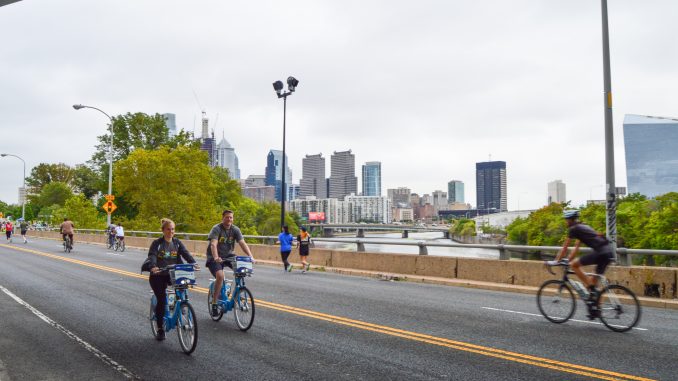
Some nights, Gabriella Upadhyay leaves her house at 3 a.m. to bike down to the Schuylkill and clear her head.
“It’s quiet at night and it helps me think,” she said, recalling another time she spent the early morning biking to Spruce Street Harbor Park to watch the sunrise.
“I really like to go places that make me feel small,” she added. “You see things that you just don’t see when you’re walking or taking the subway.”’
The junior geography and urban studies major started riding bikes as a child, but became more interested in cycling after buying a bike on Craigslist last semester. She said not only does taking a bike to classes save her time and money, it serves as her daily exercise.
“I bike to class every morning and I feel awake and motivated,” she said. “And it’s fun.”
As biking becomes more popular for students like Upadhyay and for people throughout the city, accessibility and events like Philly Free Streets are in higher demand. On Saturday, 10 miles of road along the Schuylkill and the entirety of South Street were shut down to cars, allowing people to walk, bike and skate in the streets.
This time people, not cars, filled the streets with bicycles and skateboards weaving in and out of the crowds. Along the route, people participated in dozens of activities and games held throughout the event including riverside yoga, salsa dance lessons and a Mural Arts mural maze.
After the excitement over the open streets from the Pope’s visit last year, Open Streets PHL was created as a nonprofit that works to help bring more open streets to the city. With their advocacy, the City of Philadelphia put on Philly Free Streets as the city’s first open streets event.
Upadhyay said while most parts of Philly are relatively bike-friendly, more effort could be made to encourage “people-powered transportation,” a term used by the new city initiative, Philly Free Streets.
While open street programs are held throughout the country and world, Philly Free Streets, run by the city’s Managing Director’s Office of Transportation & Infrastructure Systems, teamed up with different city departments, like the Philadelphia Water Department, the city’s Mural Arts Program and the Office of the City Representative, to create an event that encouraged Philadelphians of all ages to spend their morning car-free.
“We want to promote walking and biking as a mode of transportation,” said Charlotte Castle, a transportation planner at OTIS who graduated from Temple with a master’s in geography and urban studies in 2015. “We’re getting people out of their cars and physically active in their day-to-day life in order to improve the health of our community.”
Cyclists also have to deal with the pitted roads and potholes on and around Main Campus, as well as having to get accustomed to biking in an urban environment, something Upadhyay found “tricky” at first, but soon grew used to, she said.
Xavier Nogueira, a sophomore geography and urban studies major, had little difficulty transitioning to biking in Philadelphia since he grew up riding in Washington D.C. As a freshman, Nogueira said he wanted to continue his love for biking. He joined the Temple Cycling Club and became the club’s vice president this year.
Temple’s Cycling Club hosts different rides during the year that take the club throughout the city and have the opportunity to compete in races all along the East Coast in the spring semester.
For Nogueira, south of Center City is the best place to bike because it has several wide streets with bike lanes and smoother pavement. He also agreed with Upadhyay that biking around campus can be difficult at times.
“Cities would definitely be great if they were designed to promote exploration and visiting of areas,” he said. “Moving forward with urban planning and what not I think that should be the goal of every city, to create a place where people want to be in the street.”
Nogueira said people’s experience in the city is “completely dictated” by cars.
“Walking and biking is completely external, the feel of the city, the sights and sounds, that’s what’s building your experience,” he added. “With biking … you can intimately experience large parts of the city in an afternoon or on your way to work. I see it as a daily adventure.”
Emily Ralsten can be reached at emily.ralsten.thomas@temple.edu.


Be the first to comment